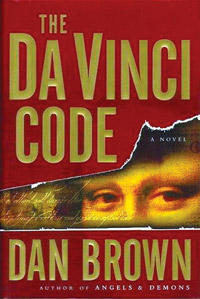The codes we live by
 The
question is obvious: Why The Da Vinci Code? Why has one novel among many
recent and similar novels, one fictional work among many speculative
works over the last fifty years, and one presentation of “facts” as
“fiction” captured the imaginations and the interest of both the common
reader and the critical academic? The
question is obvious: Why The Da Vinci Code? Why has one novel among many
recent and similar novels, one fictional work among many speculative
works over the last fifty years, and one presentation of “facts” as
“fiction” captured the imaginations and the interest of both the common
reader and the critical academic?
The answer is both obvious and obscure, like The Da Vinci Code’s
sources and secrets. To find an answer, or perhaps several answers, I
have referred a number of scholars—religious, literary, cultural—to
examine the cultural phenomenon which has become The Da Vinci Code
controversy.

Specifically, these critics go beyond the continuing debate over the
validity of sources and stories, of histories and alternative histories.
They look at this text in terms of the controversy which it has caused,
and why it has caused such controversy. It is easy to observe that The
Da Vinci Code has been a powerful catalyst. The intriguing question for
academics and other cultural observers: a catalyst in what mixture of
forces, ideas, values? One book has functioned to trigger a cultural
explosion, but what were the ingredients, waiting to react?
One thing is clear: the answer always manifests itself at the
intersection of fact and fiction. Every scholarly debate, in one way or
another, returns to these fundamental questions: What is fact? What is
fiction? The width of the gap between fact and fiction is the key
ingredient of postmodernism. Therefore The Da Vinci Code has become a
milestone of post-modern literature.
Regardless of what one thinks of Dan Brown’s novel The Da Vinci Code,
a couple of facts are indisputable. Individually, tens of millions of
people worldwide have read the novel. Publicly, it has gotten a lot of
attention. That’s a bit of an understatement. This one contemporary
novel has generated at least fifty other books which claim to explain,
to debunk, to criticize, or to capitalize on the attention. Likewise,
universities have created courses to do the same.
Conferences have been held worldwide, including in Leonardo’s
hometown of Vinci, Italy, mostly to debate the factual errors, the
historical inaccuracies the The Da Vinci Code. Even the Vatican itself
has joined the debate, one which will surely continue for years.
We, however, are not concerned only with alleged errors or
inaccuracies, at least not those that may or may not be contained in
this novel. We are concerned with the perhaps unprecedented reaction to
a popular novel by otherwise sober academics and their institutions, by
religious leaders and organizations more often concerned with people’s
souls rather than a book’s sales, by the common readers who seem so
impassioned by a retelling of the passion of the Christ which previously
had become for so many passé. The Da Vinci Code, like it or not, has
entered the academy. And so we begin to look—not at the book’s
veracity—but at our collective reaction to what is now a debate beyond
one book, but a debate about all of our stories. Be they scholarly or
popular, religious or radical, sacred or profane, these are the codes we
live by.
Here, I am talking about the fact that The Da Vinci Code has become
more than a novel. That was the key, we agreed. It’s not about Brown,
the novel, or Leonardo da Vinci. It is the rekindling of desire, desire
to reconnect with the divine in a world which has been robbed of divine
secrets and stripped of divine codes, a world which continues to erase
the wisdom of the ancients, and which denies that our stories can
contain truth, even a glimpse of it. It’s the post-modern dilemma.
Everything is a text. We have always had stories, and for most of human
history, stories were true. Stories were, and are, where we keep the
truth, or at least something close to it. The novel’s speculations about
history and religion do not so much suggest lies as they suggest that
truth, and true stories, still exist. |



